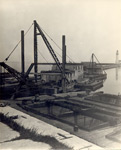Just Around the Corner
- Publication
- Syracuse Post-Standard (Syracuse, NY), 27 Oct 1946
- Full Text
The breaking waves dashed high
On a stern and rockbound coast.
And the woods, against a stormy sky,
Their giant branches tossed."
When the schooner "Illinois" left Sacket Harbor with 104 passengers and a crew of nine bound for the village of Chicago on Lake Michigan. The date was May 12, 1834 and this was the little schooner’s maiden voyage. She had been built during the winter by Augustus Pickering at Sacket Harbor. She was 80 feet long 20 in breadth, with an eight-foot hold. This was the maximum size which could be floated thru the wooden locks of the Welland Canal.
The cargo of the craft consisted of the household goods and farming implements of the passengers- for these folks were bound "westward Ho!" early examples of that pioneer spirit which drives men on and on and ever on, in search of new horizons and new fields of endeavor.
They had, after due consideration, decided upon this means of transportation as the one most feasible-railroads being yet in their puling infancy and steam vessels not yet past the experimental stage.
They placed Pickering, the shipwright in command of the craft, he having had large experience in Great Lakes navigation., and Capt. Pickering rounded up his crew of nine from among seasoned lake-sailing of his own acquaintance.
The passengers represented some 28 families, many of whose descendants are now prosperous farmers and businessmen of Illinois and its adjacencies. Among these may be mentioned: George L. Dickenson and wife Parker Symonds and family of Five: Frenau, Vanalstine: Honus Koppenhaver; Jared Mustavis: Pierre DeLansau: Kevner Smith" Eliphalet Huston and many others.
Their voyage thru Ontario was devoid of untoward incident: they barely scraped thru the Welland Canal docks, without the loss of much paint; and continued thru Erie favored by offshore wind and good weather.
They weathered a severe storm in the upper reaches of Lake Huron, but came thru unscathed of yard or hull, into Lake Michigan thru the Mackenzie, Capt. Pickering handled his stout craft with such masterly skill as to cause the passengers to congratulate themselves on their happy choice of a navigator.
The "Illinois" arrived at the mouth of Chicago creek (river) on June 14, 1834; but it could not enter the "harbor" since there was no harbor-nothing but a huge and impassable sand bar across the mouth of the river. There were no docks, no tugs, no lights,-nothing but mud everywhere. The streets were mud, the fields were mud and most of the ramshackle dwellings were built on piles driven deep into the mud-in fact, Chicago at this period was popularly known as "Mud Flats."
Undeterred by this difficulty, our little band of sturdy pioneers put themselves ashore by means of the ship’s yawl, and floated in their household goods and agricultural tools on rafts, as the weather would permit. At this time Chicago had only one hotel, which boasted the name of Travelers Rest- not much to boast of, at best- and the easterners were put to great straits in the matter of housing. However the villagers were true exponents of the now famous "western hospitality" and left no stone or gob of mud unturned in the efforts to aid their welcome visitors. The district Indian agent, Ian McKenzie was especially active in providing for them and they were finally all taken care of in the matter of lodging.
Be it remarked ere in passing, that very few of the voyagers remained any great length of time within the environs of "Mud Flats." They spread out thru the fat farm lands of Illinois and Michigan; where to this day they progeny still hold a spot in their hearts for Sacket Harbor and New York State- their "motherland."
After the cargo of the schooner had been all floated ashore, some of the villagers consulted with Capt. Pickering as to the feasibility of getting the craft over the bar, since she was now so considerably lightened of her load.
"Name of a name of a name," cried Jules L’Esque, the tavern-keeper, "You have call her Illinois’ and to Illinois she have come. Let us, then, bring her over Le Gros Barre and let her ride in ze harboure, Mon Capitaine,-en bien?"
After considerable consultation and calculation, it was decided that the matter was feasible, inasmuch as there was about four feet of water covering the obstruction a the mouth of the harbor and the uncargoed Illinois barley drew that much.
So, on June 28, 1834, anchors were carried out, a purchase rove to the windlass, and with much vigorous shouting rolling of the schooner’s booms and heaving at the windlass, the thing was accomplished and the schooner "Illinois" floated proudly in the port of Chicago- the first vessel ever to ride that harbour.
"By the great horn spoon, we done it!" shouted Eleazer Whitcomb, the blacksmith, as he gazed upward at the tall masts, glittering in the golden glow of the westering sun,"now we got everything by gravy- a lake, a river, a harbor, and a danged fine passel o’ new residenters."
And he grasped Capt. Pickering by a not-too-unwilling arm and hustled him of to L’ Esque’s tavern; there to hold high wassail.. In the midst of which, the sturdy smith elevated his already stentorian voice and proposed this toast:
"God bless our neighbors-an’ the mud be damned!"
- Creator
- Bertrande, Author
- Media Type
- Text
- Newspaper
- Item Type
- Clippings
- Date of Publication
- 27 Oct 1946
- Subject(s)
- Language of Item
- English
- Geographic Coverage
-
-
Illinois, United States
Latitude: 41.85003 Longitude: -87.65005
-
- Donor
- Richard Palmer
- Creative Commons licence
 [more details]
[more details]- Copyright Statement
- Copyright status unknown. Responsibility for determining the copyright status and any use rests exclusively with the user.
- Contact
- Maritime History of the Great LakesEmail:walter@maritimehistoryofthegreatlakes.ca
Website:


